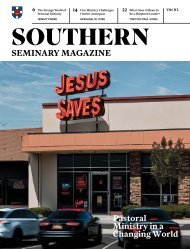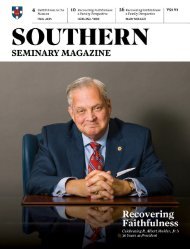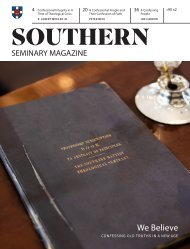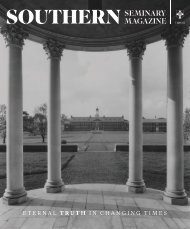Southern Seminary Magazine (Vol 90.1) The Light of Truth: Apologetics in the 21st Century
Create successful ePaper yourself
Turn your PDF publications into a flip-book with our unique Google optimized e-Paper software.
play<strong>in</strong>g <strong>of</strong>fense<br />
Scripture, but reason as well. But if it’s reasonable, it will<br />
never be at odds with Scripture. If <strong>the</strong>re are reasoned<br />
justifications for <strong>the</strong> ethics we espouse that satisfy <strong>the</strong><br />
criteria for rational soundness, <strong>the</strong>n where that truth is<br />
located—whe<strong>the</strong>r <strong>in</strong> special revelation or general revelation—is<br />
irrelevant.<br />
What matters is whe<strong>the</strong>r <strong>the</strong> argument <strong>in</strong> question is<br />
true or false. No tenet <strong>of</strong> Christian ethics will ever be<br />
at odds with what reason can know as true. <strong>The</strong>refore,<br />
when we speak <strong>of</strong> “Christian Ethics,” we speak <strong>of</strong> an <strong>in</strong>herently<br />
public discipl<strong>in</strong>e because Christian ethics are<br />
grounded <strong>in</strong> creation, div<strong>in</strong>ely attested to <strong>in</strong> Scripture,<br />
and confirmed by reason. <strong>The</strong> truthfulness <strong>of</strong> our ethics<br />
is not a private, self-disclosed reality.<br />
Deploy <strong>the</strong> Full Range <strong>of</strong><br />
God-Given Arguments<br />
What I want to encourage you with <strong>in</strong> this brief essay<br />
is not so much <strong>the</strong> correctness <strong>of</strong> Christian ethics upon<br />
such matters as abortion, sexual ethics, and gender—and<br />
<strong>in</strong>deed, <strong>the</strong>y are true—but how Christians should th<strong>in</strong>k<br />
about our arguments <strong>in</strong> <strong>the</strong>mselves. I say this because<br />
<strong>the</strong>re is a tendency among Christians to th<strong>in</strong>k that our<br />
viewpo<strong>in</strong>ts only have merit because <strong>the</strong>y are found <strong>in</strong><br />
Scripture. Of course, <strong>the</strong>y have <strong>in</strong>f<strong>in</strong>ite worth because<br />
<strong>the</strong>y are found <strong>in</strong> Scripture, but <strong>the</strong>ir soundness expands<br />
beyond just Scripture. <strong>The</strong>ir truthfulness reflects <strong>the</strong> pattern<br />
<strong>of</strong> an orderly creation patterned by God. Practically<br />
speak<strong>in</strong>g, it means <strong>the</strong> pro-choice advocate or transgender<br />
activist is revolt<strong>in</strong>g aga<strong>in</strong>st both reason and revelation.<br />
But I’d like to suggest that ground<strong>in</strong>g our ethics and<br />
<strong>the</strong> call to public apologetics <strong>in</strong> Scripture alone is to bypass<br />
<strong>the</strong> full range <strong>of</strong> arguments that God gives us. We<br />
should never appeal any less to Scripture. We are, after<br />
all, Protestants who believe <strong>in</strong> sola Scriptura. But sola<br />
Scriptura is not solo Scriptura. It has never been <strong>the</strong> position<br />
<strong>of</strong> Christian ethics that authority is found only with<strong>in</strong><br />
Scripture, but that Scripture is our ultimate authority.<br />
<strong>The</strong> basic question this raises is whe<strong>the</strong>r <strong>the</strong>re are o<strong>the</strong>r<br />
valid sources <strong>of</strong> authority that Christians should consider<br />
when mak<strong>in</strong>g public arguments. Sound reason that<br />
comports with God’s creation is one <strong>of</strong> <strong>the</strong>m.<br />
All matters <strong>of</strong> public policy and cultural flash-po<strong>in</strong>ts<br />
subject to <strong>in</strong>tense debate <strong>in</strong> <strong>the</strong> public arena, if <strong>the</strong>y are<br />
essential to organiz<strong>in</strong>g our shared life around, ought to<br />
and can be debated on <strong>the</strong> basis <strong>of</strong> reason, which is never<br />
disconnected from <strong>the</strong>ology, but merely its entailment.<br />
Fur<strong>the</strong>r, any pr<strong>in</strong>ciple <strong>of</strong> public policy that a Christian<br />
would want to see codified as a sound reflection <strong>of</strong> biblical<br />
morality would necessarily be grounded <strong>in</strong> <strong>the</strong> natural<br />
law. Any cultural debate that requires Christians to<br />
<strong>of</strong>fer a def<strong>in</strong>itive response must never be at odds with<br />
reason; if it were, it would not be grounded <strong>in</strong> God’s eternal<br />
law from <strong>the</strong> start.<br />
For example, it is ei<strong>the</strong>r reasonable or unreasonable to<br />
kill an unborn child <strong>in</strong> <strong>the</strong> womb. This is ei<strong>the</strong>r a morally<br />
good act or a morally evil act. What it cannot be is morally<br />
benign. Reasoned arguments that are grounded <strong>in</strong> a<br />
scriptural worldview require us to consider whe<strong>the</strong>r <strong>the</strong><br />
pr<strong>in</strong>ciple that would license abortion is <strong>in</strong> fact worthy <strong>of</strong><br />
our affirmation. But both reason and revelation testify to<br />
abortion’s unreasonableness. It constitutes <strong>the</strong> unlawful<br />
tak<strong>in</strong>g <strong>of</strong> human life, which is a violation <strong>of</strong> <strong>the</strong> right to<br />
life and God’s authorship <strong>of</strong> life, and it is <strong>the</strong>refore a violation<br />
<strong>of</strong> <strong>the</strong> sixth commandment (Ex. 20:13).<br />
But to determ<strong>in</strong>e whe<strong>the</strong>r abortion violates <strong>the</strong> sixth<br />
commandment, I need to apply pr<strong>in</strong>ciples <strong>of</strong> reason to<br />
determ<strong>in</strong>e whe<strong>the</strong>r <strong>the</strong> unborn child meets <strong>the</strong> threshold<br />
<strong>of</strong> a right to life. That requires understand<strong>in</strong>gs <strong>of</strong> hermeneutics,<br />
philosophy, biology, embryology, and ethics. All<br />
this means is that <strong>in</strong> a topic like abortion, we need to argue<br />
from all sources that coord<strong>in</strong>ate to <strong>the</strong> truthfulness<br />
<strong>of</strong> abortion be<strong>in</strong>g s<strong>in</strong>ful.<br />
Total Ethics, Total Christ<br />
<strong>The</strong> task <strong>of</strong> public apologetics is to bear witness to <strong>the</strong><br />
total Christ. <strong>The</strong> Christ who redeems is <strong>the</strong> same Christ<br />
who creates and orders (John 1:3; Col. 1:15-17). Where<br />
Christ is rejected, nature and reason are dismissed as well,<br />
which produces <strong>the</strong> very pottage <strong>of</strong> decay all around us:<br />
an anti-culture bask<strong>in</strong>g <strong>in</strong> <strong>the</strong> absurd and <strong>the</strong> perverse.<br />
Perhaps <strong>the</strong> greatest non-canonical <strong>the</strong>ologian <strong>of</strong> <strong>the</strong><br />
church, August<strong>in</strong>e, echoed such a similar refra<strong>in</strong> when<br />
he admonished his readers:<br />
Let us attend to <strong>the</strong> real matter <strong>in</strong> debate, and let<br />
our arguments appeal to reason and to <strong>the</strong> authoritative<br />
teach<strong>in</strong>g <strong>of</strong> <strong>the</strong> Div<strong>in</strong>e Scriptures, dispassionately<br />
and calmly, so far as we are able.<br />
<strong>The</strong>re’s no pr<strong>in</strong>ciple <strong>of</strong> Christian morality, whe<strong>the</strong>r decreed<br />
<strong>in</strong> Scripture or attested to <strong>in</strong> nature, that is not<br />
simultaneously ordered to God’s glory and our good. If<br />
good, an ord<strong>in</strong>ance <strong>of</strong> reason; if reasonable, it is sound; if<br />
sound, it is b<strong>in</strong>d<strong>in</strong>g; if b<strong>in</strong>d<strong>in</strong>g, it is God-orda<strong>in</strong>ed.<br />
Christianity provides <strong>the</strong> most consistent, coherent account<br />
<strong>of</strong> morality necessary for <strong>the</strong> task <strong>of</strong> public apologetics.<br />
It <strong>of</strong>fers God as <strong>the</strong> source <strong>of</strong> our ethics, reason as<br />
<strong>the</strong> basis <strong>of</strong> moral knowledge, and an all-encompass<strong>in</strong>g<br />
goal: our good, but chiefly, God’s glory.<br />
Andrew T. Walker is Associate Pr<strong>of</strong>essor <strong>of</strong> Christian Ethics<br />
and <strong>Apologetics</strong> and Associate Dean <strong>of</strong> <strong>the</strong> School <strong>of</strong> <strong>The</strong>ology.<br />
30 <strong>the</strong> sou<strong>the</strong>rn baptist <strong>the</strong>ological sem<strong>in</strong>ary






